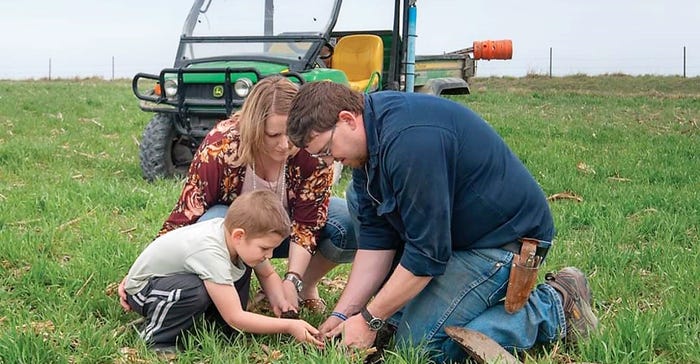
When young people graduate from college and return to the farm, they often look for something to make their mark, an idea that moves the farming operation forward. For Michael Jackson, the one thing he grabbed ahold of with two hands and hasn’t let go of is cover crops.
The Jackson family farm in Oskaloosa, Iowa, has been no-tilling soybeans since the late 1980s. “We were no-tilling corn, which was kind of a little bit unheard of in south-central Iowa,” Michael says. The sixth-generation farmer says farm preservation has always been a big part of their diversified farm, where they raise corn, soybeans and hogs.
The farm uses conservation practices like 20,000 feet of terraces, more than 100 acres of wetlands, settling ponds, buffers strips, grassways and headlands. “The goal of the farm is to sustain the soil and leave a legacy with cleaner water and a strong economic bottom line with less input costs,” Michael says. And that is where cover crops come in.
Adding farm value
Michael added Jackson Seed Sales to the family operation. His company sells for Iowa Cover Crop, as well as, Latham Hi-Tech Seeds. “We get all of our cover crop seed out of Nebraska, South and North Dakota,” he says. “States where they can really grow small grains.”
While he sells cover crops to others in the area, the family incorporates the practice on the farm. Cover crops, according to Michael, are the one thing that helps farmers with erosion control, increases soil’s organic matter and offers results in dry years. “It just increases water-holding capacity.”
The Jacksons invested in a 40-foot no-till drill, allowing Michael to seed covers in the fall. However, he also uses it with a custom drilling business.
The couple also take part in the Iowa Soybean Association’s on-farm research to determine the best ways to integrate cover crops into a row crop operation. They share their experiences by hosting field days.
Family-focused
Michael’s pressing need to make the farm sustainable came when he put down roots with his family. He married Mary Beth and together the couple have three children, Arianna, Johnathon and Mack. Mary Beth also joined the operation as the bookkeeper for the farm and seed business. They both agree that adding cover crops provides more stabilization for the next generation.
“Everything I do, I'm not thinking about making a profit for myself,” Michael says. “I'm thinking about being able to pass it on my sons or my daughter, and on down the line. I mean, I'd love to see 12 generations of Jackson family farmers when the farm gets to be a 200-year-old farm.”
The farm is already a Century Farm, as his grandmother’s great-grandfather purchased the land back in 1890.
But there is more to a farm than just production practices. The couple are active in their local community and their church. They participate in Ag in the Classroom and provide virtual tours of their farm through Skype. “We’ve reached as far as Florida,” says Mary Beth, who grew up on a dairy and hog operation. “It is about helping the next generation understand how their food is produced.”
For their efforts on and off the farm, the Jacksons were one of four young farmers winning the National Outstanding Young Farmer Award from the Outstanding Farmers of America earlier this year. The program’s goal is to highlight young farmers and recognize their contributions and achievements in farming and their community. It is administered by the U.S. Junior Chamber and the National Association of Conservation Districts.
About the Author(s)
You May Also Like






